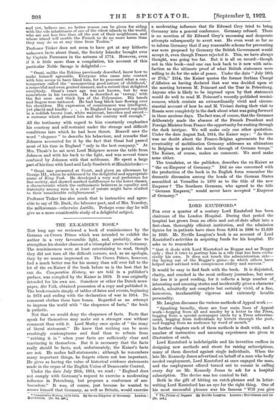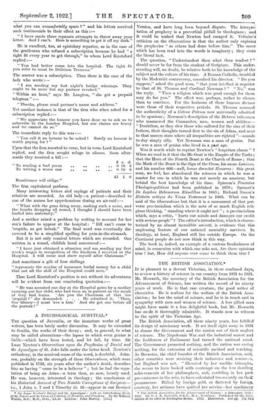LORD KNUTSFORD.*
FOR over a quarter of a century Lord Knutsford has been chairman of the London Hospital. During that period the hospital has grown from an effete and out-of-date affair into a
first-class, thoroughly efficient institution, and the admission figures for in-patients have risen from 9,954 in 1896 to 21,639 in 1920. Mr. Neville Langton's book is an account of Lord Knuteford's activities in acquiring funds for his hospital. Ho asks us to remember " that it deals with Lord Knutsford as Beggar and as Beggar only ; that it tries to portray him in a robe that has been exclu- sively his own. It does not touch the administration side— the laying out of the Beggar's gains—in which others have helped and advised with conspicuous ability and success."
It would be easy to find fault with the book. It is disjointed, chatty, and couched in the most ordinary journalese, but none the less it is good reading, for it collects a large number of interesting and amusing stories and incidentally gives a character sketch, admittedly not complete but certainly vivid, of a fine, humorous, inexhaustibly vigorous and extremely lovable personality.
Mr. Langton discusses the various methods of Appeal work :- " Speaking broadly, there are four main lines of Appeal work—begging from all and sundry by a letter to the Press, begging from a special newspaper circle by a Press advertise- ment, begging from individuals by letters through the post, and begging from an audience by word of mouth."
In further chapters each of these methods is dealt with, and a number of instructive and amusing experiences are given in illustration of each.
Lord Knutsford is indefatigable and his invention endless in designing new methods and stunts for raising subscriptions, many of them directed against single individuals. When the late Mr. Kennedy Jones advertised on behalf of a man who badly needed employment, Lord Knutsford at once engaged the man, and the employment offered turned out to consist in calling every day on Mr. Kennedy Jones to ask for a hospital subscription. The device was too comical to fail.
Both in the gift of hitting on catch-phrases and in letter-
writing Lord Knutsford has an eye for the right thing. One of his most successful phrases was his famous " Will you give
• The Prince of Beggars By Neville Langton. London : Hutchinson and Co net4
what you can uncomfortably spare ? " and his letters received such testimonials to their effect as this :— " I have made three separate attempts to throw away your letter. And I can't. Here is something to get it off my desk."
He is excellent, too, at epistolary repartee, as in the case of the gentleman who refused a subscription because he had " a tight fit every year to get through," to whom Lord Knutsford replied :— " You had better come into the hospital. The tight fit you refer to must be Delirium Tremens."
The answer was a subscription. Then there is the case of the lady who wrote :- " I am sending my last night's bridge winnings. They ought to be more but my partner revoked."
" Within an hour," says Mr. Langton, " she got a prepaid telegram " :— " Thanks, please send partner's name and address."
Yet another instance is that of the firm who when asked for a subscription replied :— " We appreciate the honour you have done us to ask us to subscribe to the London Hospital, but our claims are heavy and we cannot do so."
The immediate reply to this was :- " You call it an honour to be asked ! Surely an honour is worth paying for ? "
Upon that the firm resorted to verse, but in verse Lord Knutsford replied, and the firm sought refuge in silence. Soon after- wards they received a bill :—
£ s. d.
" To reading a bad poem • • • . • • .. 0 10 6 To writing a worse one • . • • • . .. 0 10 6
£1 1 0 Remittance will oblige."
The firm capitulated perforce.
Many interesting letters and sayings of patients and their relatives are recorded. An old lady—a patient—described to one of the nurses her apprehensions during an air-raid :- "What with the guns firing away, making such a noise, and the bombs dropping all round, I thought' I should have been hurled into maternity."
And a mother raised a problem by writing to account for her son's failure to appear at the hospital : " Bill can't come to 'orspitle, as got beleak." The final word was eventually dis- covered to be a simplified spelling for pain-in-the-stomach.
But it is not only comical letters which are recorded. One written in a round, childish hand announced :-
" I have just obtained a situation and am sending my first week's wages in recognition of the kindness I received at the Hospital. I will come and show myself after Christmas."
And sometimes a gift of four shillings " represents the residue of insurance burial money for a child that not all the skill of the Hospital could save."
That Lord Knutsford's position is not without its adventures will be evident from our concluding quotation :—
" He was accosted one day at the Hospital gates by a mother carrying out her child, who had been an in-patient as the result of very bad burns. ' Are you the Chairman of this 'ere 'orspital ' she demanded. . . . He admitted it. ' Then, Gor blimey—I must 'ave a kiss.' And she got one before all the porters ! "



































 Previous page
Previous page